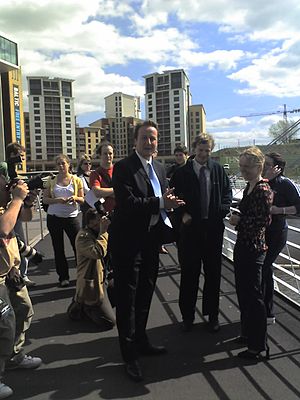Adultery, underage sex and lying not a problem for more modern Britons
 Image via Wikipedia
Image via WikipediaCOLCHESTER, UK, January 29, 2012 (LifeSiteNews.com) – Lying, adultery, under-age sex, homosexuality drug-use and buying stolen goods are not of much concern to an increasing number of Britons, a study from the University of Essex has found.
In 2000, seven out of ten people said an adulterous affair could never be justified, the Centre for the Study of Integrity said in a media release. By 2011 that figure had dropped to around five out of ten. In 2000 four out of ten Britons said keeping money found in the street was never justified; in 2011, the number had dropped to fewer than two in ten. Only one in three condemned lying in their own interests, a slight drop from 2000.
Published January 25th, the integrity survey focused not on increasing crime statistics, but on “low level dishonesty and anti-social activities” that indicate a general lowering of moral standards in society. It asked 2000 respondents’ attitudes towards a wide range of topics from lying, littering and speeding to cheating on taxes and conducting adulterous affairs. The survey didn’t ask whether they would do these things themselves, but whether the activities were “socially acceptable.”
The study’s author, Professor Paul Whiteley, said the survey, with its “integrity test,” indicates a worrying trend for civil society. “If social capital is low,” he said, “and people are suspicious and don’t work together, those communities have worse health, worse educational performance, they are less happy and they are less economically developed and entrepreneurial. It really does have a profound effect.”
The study noted that younger people were more likely to have a “relaxed” attitude toward wrongdoing. On an “integrity scale,” those under 25 scored an average of 47 points compared to an average score of 54 points for those over 65.
The report also noted the kinds of things that Britons felt were morally unacceptable, with widespread condemnation of littering, drunk driving and claiming government benefits under false pretenses at one end the scale and the broad toleration of smoking cannabis and underage sex at the other.
Little of this will come as a surprise to observers of the British social scene, or even to casual readers of the news. After years of warnings about Britain’s “feral youth” – young people raised on multigenerational-welfare dependency with no coherent family structure and post-Christian anything-goes moral standards – the problem exploded violently this summer.

Prime Minister David Cameron has stirred up controversy by calling for a return to “traditional Christian morality.”
In early August, the world watched as thousands of young people rampaged through the streets of several major British cities, smiling cheerfully at cameras while they looted shops and burned homes and businesses largely unimpeded by police. In all, about 3,100 people were arrested for crimes related to the “English Riots” that spread from inner city London to Bristol, Manchester, Birmingham, Wolverhampton, Nottingham, Salford and Liverpool. Five people were killed and at least 16 injured and the property damage was estimated at £200 million.
Conservative party Prime Minister David Cameron has long bewailed the state of “broken Britain,” a phrase which resonated well with voters who rejected Labour’s long rule with its massive program of social re-engineering. A major policy theory of the now-ruling Conservatives is that “broken Britain” can be fixed with a “ground-up” policy involving local communities and individual action to restore Britain’s “social cohesion” and moral integrity.
This flagship policy of the 2010 Conservative Party election manifesto, called “Big Society,” was meant to encourage volunteerism, to transfer power from central to local government, and to support co-ops and charities to take the load off of Britain’s massive, and increasingly unaffordable, welfare state. But the findings of the Integrity Survey, Professor Whiteley said, will obviously have an impact on the plan. “If integrity continues to decline in the future then it will be very difficult to mobilise volunteers to support the Big Society initiative,” he believes.
In response to the riots, Cameron stirred up controversy this December by calling for a return to “traditional Christian morality.” In a speech marking the 400th anniversary of the publication of the King James Bible, Cameron said, “One of the biggest lessons of the riots is that we’ve got stand up for our values if we are to confront the slow-motion moral collapse that has taken place in parts of our country these past few generations.”
There would appear to be, however, little consensus in Britain as to what, exactly, constitutes moral behavior. Like most people, Britons regard themselves as generally moral, but adultery, extra and pre-marital sex are more popular than ever, with the numbers of people getting married continuing to slide. Meanwhile, so popular has adultery become that there is a whole category of online dating in Britain specialising in helping married people conduct affairs. One of the many sites available, IllicitEncounters.com, founded in 2003, claims to be the UK’s largest with a reported 540,000 members.
As for abortion, an August 2005 YouGov survey for the Daily Telegraph found only 6 percent of Britons thought it “should never be allowed.”
And while David Cameron calls for a return to traditional morality, his government is eagerly pursuing the legalization of “gay marriage,” and has taken no steps to cap the country’s burgeoning abortion rate. Prime Minister Cameron himself the father of a disabled child, has said that he fully supportsrestrictionless abortion for disabled unborn children.


